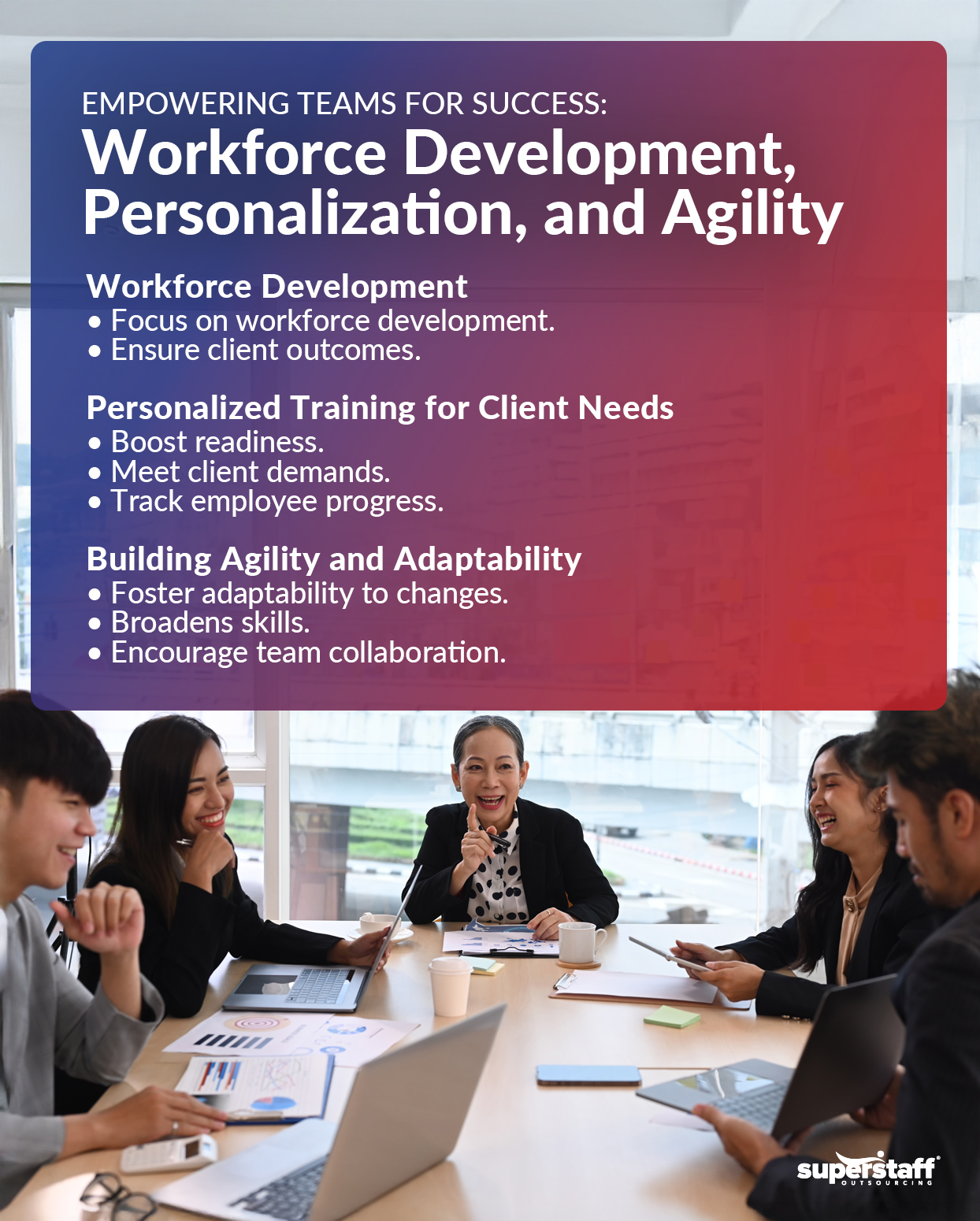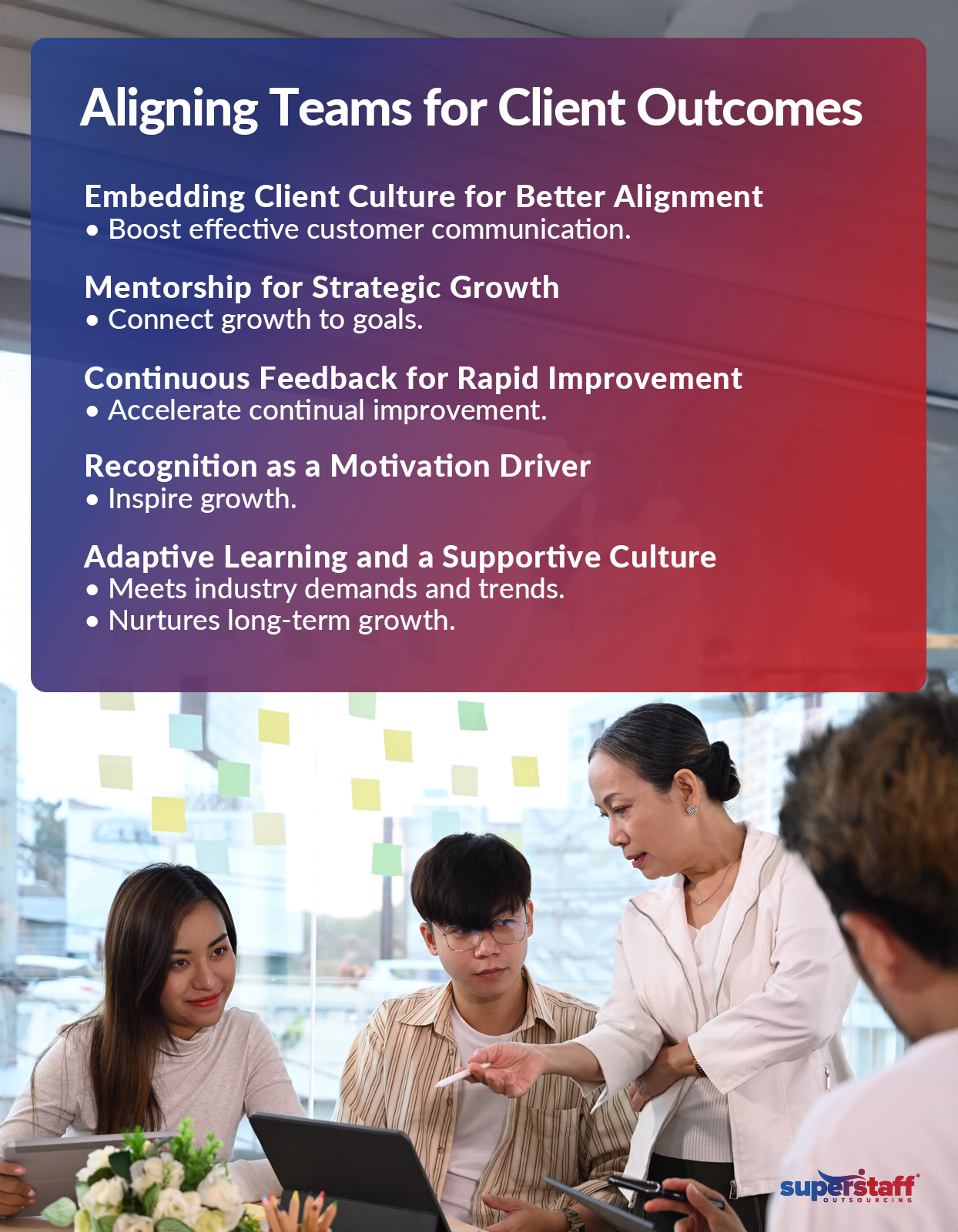
Client satisfaction alone is no longer enough to stay ahead.
Today’s most successful BPOs understand that a motivated, well-trained workforce is the foundation for meeting evolving client needs and driving business outcomes. Investing in employee growth doesn’t just strengthen teams. It creates a ripple effect that enhances adaptability, innovation, and client partnerships.
Skill sets for jobs have shifted by 25% since 2015 and are expected to double by 2027. Employee growth is no longer optional—it’s essential. For BPOs, tailoring employee growth and development pathways to meet client needs isn’t just about workforce readiness; it’s about sustaining relevance in a hyper-competitive market.
This blog examines how leading providers prioritize workforce development to deliver exceptional results. From tailored training programs to mentorship and real-time feedback, these strategies empower teams to thrive in dynamic environments while aligning personal growth with client goals.
Discover how cultivating a skilled and engaged workforce can transform your BPO operations and elevate your client relationships.
Customized Development for Real Impact

Personalized training ensures that each employee’s strengths align with the precise demands of clients. This strategic approach equips teams with critical skills and drives better outcomes for the client and the organization. Offering role-specific upskilling in digital transformation, leadership, and customer service positions employees to address client-specific challenges effectively. It’s no wonder providing employee opportunities for growth is the top strategy for improving retention.
Why Engagement and Motivation Matter
Engaged learners are the backbone of a high-performing workforce. According to the latest findings, engaged employees express greater adaptability and a stronger sense of advancement. For most, “progress toward career goals” is the number one motivation to learn. This alignment between personal and professional growth fosters loyalty, with employees who make internal moves showing a higher likelihood of staying at their companies for two years or more.
Yet, only 35% of learners reported being encouraged to pursue learning by their managers in the past six months. For BPOs, this presents an opportunity: embedding learning into the culture not only strengthens teams but also aligns with the priorities of global leaders, who increasingly view HR and people strategies as mission-critical.
Actionable Insights for BPO Success
- Targeted Skill Development: Offering specialized technical training in IT support, customer service, or data analytics ensures teams stay ahead of industry demands. This focus allows employees to exceed client expectations, positioning the organization as a trusted partner.
- Cross-Functional Learning: With 2023 emphasizing leadership, digital upskilling, and career development, BPOs can provide cross-functional training to prepare employees for more dynamic roles.
- Feedback-Driven Growth: Regular performance reviews incorporating client feedback enable continuous alignment with client goals. This iterative approach fosters trust and ensures sustained success.
The Road Ahead: Agility and Adaptability
As client needs evolve, agility in learning and development becomes a competitive differentiator. A workforce with the right skills is better positioned to adapt to new challenges and deliver value. By embedding customized learning pathways into their strategies, BPOs can ensure immediate and long-term success in today’s dynamic business environment.
Building Agility Through Cross-Functional Training
Agility isn’t just a buzzword—it’s a competitive advantage.
In today’s fast-paced business environment, where client needs shift constantly, a well-trained BPO team must adapt seamlessly. Cross-functional training is the cornerstone of building this agility, empowering employees to meet evolving demands while delivering unmatched client satisfaction.
Broadening Horizons Through Departmental Exposure
Employees exposed to diverse roles gain a holistic understanding of operations. This perspective enhances their ability to address challenges creatively and collaborate effectively. For instance, a customer service representative with experience in data analysis can offer unique insights when resolving customer issues, ultimately strengthening the client-BPO relationship.
Hands-On Versatility
Temporary assignments and rotational opportunities across departments transform employees into versatile assets. Experiencing different functions firsthand broadens their skill sets and fosters innovation. These cross-trained employees bring a fresh, multifaceted approach to their roles, driving greater value for clients and the organization.
Driving Collaboration Through Knowledge Sharing
Regular knowledge-sharing sessions break down silos, allowing employees from various departments to exchange insights and strategies. This collaboration fosters a unified workforce capable of approaching client needs with agility and precision.
Why It Matters: Insights from Deloitte
According to Deloitte, digitally maturing companies thrive on cross-functional collaboration:
- 83% of digitally advanced organizations leverage cross-functional teams, compared to just 55% of early-stage companies.
- 73% create environments that support these teams, while only 29% of early-stage firms provide similar support.
These practices reduce perceived organizational barriers, enabling teams to work more nimbly and effectively.
The Outcome: Aligning Employee Career Growth with Client Success
Agility goes beyond operational benefits—it aligns team growth with client needs. Cross-functional training ensures your workforce can pivot as needed, all while deepening its understanding of client cultures. In the BPO industry, where adaptability and client focus are non-negotiable, this approach is not just an advantage—it’s essential.
Embedding Client Culture Training for Maximum Alignment

Client immersion is a game-changer in delivering exceptional satisfaction.
Each client brings a unique set of values, communication norms, and expectations. By integrating client-specific culture training into employee development, BPOs equip their teams to authentically represent the client’s identity while consistently meeting—and exceeding—expectations.
Brand Voice Workshops
Crafting a seamless customer experience begins with understanding a client’s brand voice. Brand voice workshops help employees internalize the client’s tone, language, and communication style. Whether responding to customer inquiries or drafting emails, this training ensures consistent, on-brand messaging across all channels. A well-executed brand voice delivers authentic, personalized service that forges stronger connections with customers and stakeholders.
Empathy Training
Empathy fuels loyalty.
Employees who grasp the emotional nuances of client interactions are better equipped to address concerns, resolve issues, and build rapport. Empathy training hones skills like active listening, interpreting emotional cues, and crafting understanding responses. This focus transforms routine service into meaningful connections that drive satisfaction and retention.
Regular Updates on Client Values
Client culture training isn’t a one-time event—it’s a continuous commitment. Regular updates keep teams informed about shifts in a client’s values, messaging, or product offerings. This proactive alignment allows employees to respond dynamically to evolving expectations, maintaining their ability to deliver high-quality service that reflects the client’s current priorities.
Building Soft Skills Through Mentorship
Complementing culture training with mentorship programs amplifies its impact. Guided by experienced mentors, employees develop critical soft skills like communication, adaptability, and emotional intelligence. These traits enhance client satisfaction and foster professional growth, creating a team that thrives on delivering exceptional results.
The numbers prove the value of investing in culture.
Companies with strong cultures experience four times more revenue growth and achieve 72% higher employee engagement. By embedding client culture training and prioritizing empathy and alignment, BPOs are indispensable partners in their clients’ success.
Mentorship Programs: A Strategic Asset for Client-Centric Growth
Mentorship programs are more than an employee development tool. They are a powerful driver of client success in the BPO industry. By pairing junior employees with experienced mentors who understand organizational and client objectives, BPOs cultivate a culture of continuous improvement, benefiting clients and employees alike.
Strategic Mentorship: Bridging Employee Development and Growth with Client Goals
Effective mentorship programs connect personal development with business outcomes. Mentors with a deep grasp of client priorities guide employees in aligning their skills to meet these objectives. Whether enhancing problem-solving capabilities, refining communication skills, or mastering time management strategies, these programs ensure employee growth translates into measurable client value.
Building Proficiency in Communication and Problem-Solving
Excellent communication and problem-solving are at the core of superior client service. Skilled mentors lead by example, demonstrating these critical abilities and helping employees adapt their approach to complex client interactions. Consistent mentoring empowers employees to confidently manage challenging scenarios, fostering stronger client satisfaction and loyalty.
Client-Centric Soft Skills Development
Mentors are instrumental in developing client-specific soft skills, ensuring employees meet unique client needs with empathy and precision. For instance, mentors may guide employees in handling sensitive customer interactions or coach them on tailoring their communication to resonate with diverse client profiles. This targeted development enhances the quality of client engagement, strengthening relationships and delivering exceptional results.
Why Mentorship Matters: The Data Speaks
Harvard Business Review emphasizes the transformative potential of mentorship:
- Employees with strong mentors achieve faster career advancement, earn higher salaries, and show greater organizational commitment.
- Mentorship enhances personal growth, improving work-life integration and relational skills while boosting self-esteem.
- Poorly executed mentorship—often due to untrained mentors or lack of incentives—can undermine these benefits, making strategic planning essential.
The Mentorship Advantage
Integrating mentorship programs with client objectives is not just a strategy—it’s necessary for BPOs aiming to elevate performance. By investing in effective mentorship, organizations empower employees to deliver exceptional client experiences while driving their professional success.
Why Real-Time Feedback is the Missing Link in Employee Engagement
Employee engagement isn’t just a buzzword; it’s the backbone of any thriving organization. Yet, statistics reveal a significant gap between what employees need and receive. For instance, 63% of employees feel underappreciated, and 72% report receiving praise less than once a week. These numbers underscore a pressing need for organizations to rethink their approach to engagement—and real-time feedback could be the answer.
Real-Time Feedback: Transforming the Engagement Landscape
Traditional annual reviews no longer suffice in today’s fast-paced work environment. Employees crave immediate, actionable insights that enable them to grow and perform better daily. Real-time feedback systems empower organizations to address this need while fostering a culture of continuous improvement.
Performance Analytics for Instant Insights
Advanced analytics tools give employees a clear picture of their performance against key metrics. For example, when employees receive real-time updates on client satisfaction or task completion rates, they can identify improvement areas and act quickly. This proactive approach boosts individual performance and aligns employees with organizational goals.
Supervisor Check-Ins: The Human Touch
While data is critical, human connection remains irreplaceable. Regular one-on-one check-ins allow supervisors to provide tailored guidance and recognize achievements. These sessions serve as a two-way street, where employees can share challenges and managers can address them immediately. The result? Stronger relationships and more motivated teams.
The Power of Instant Feedback Loops
Instant feedback loops—whether through automated systems or direct supervisor input—offer a continuous flow of insights. Employees can adapt in real-time, ensuring they meet or exceed client expectations. For instance, 83% of employees appreciate feedback, regardless of whether it is positive or negative, emphasizing the value of immediate communication.
Recognition: The Ultimate Motivator
Organizations with robust recognition programs see a 31% decrease in voluntary turnover. Real-time feedback goes hand-in-hand with this principle. Recognizing employees for their contributions—whether through verbal praise or performance-based incentives—fosters loyalty and underscores the value of their work.
Addressing Engagement Pain Points with Real-Time Feedback
- Career Growth: Over 56% of employees feel they lack advancement opportunities. Real-time feedback and skill development plans can help bridge this gap.
- Wellness and Stress: Nearly 47% of employees report feeling stressed. Immediate feedback systems can identify workload imbalances, allowing organizations to address these issues proactively.
- Goal Clarity: With 72% of employees wishing for clearer goals, feedback loops can continuously align individual objectives with broader company targets.
The data doesn’t lie—employee engagement hinges on timely recognition, clear communication, and growth opportunities. Real-time feedback mechanisms provide the foundation for all three, transforming workplaces into environments where employees feel valued, supported, and empowered to excel.
Incorporating these strategies is more than just an HR initiative; it’s a business imperative. By investing in real-time feedback, organizations can unlock the full potential of their workforce and drive sustainable success.
Recognition in the Workplace: A Culture Shift Driving Engagement and Success
For the fourth consecutive year, the percentage of employees being thanked for their contributions has climbed, signaling a growing emphasis on workplace appreciation. Yet, while one-third of employees reported receiving thanks in the past month, over half expressed that such gestures occurred only within the last 1-2 months. The disparity raises a critical question: Is your organization leveraging recognition to its fullest potential?
Gratitude Drives Engagement and Purpose
The impact of workplace recognition is undeniable. Employees who receive gratitude regularly are:
- 2x as likely to be highly engaged.
- 3x as likely to find meaning and purpose in their work.
- 4x as likely to believe leadership appreciates their contributions.
- 4x as likely to report happiness at work.
- Less likely to experience stress compared to their non-recognized peers.
Gratitude doesn’t just boost morale; it builds a foundation for meaningful employee experiences, stronger leadership perceptions, and a more resilient organizational culture.
Client Success: Recognition Meets Results
In the BPO industry, recognition tied to client success amplifies its power. Acknowledging employees for achievements that directly impact clients fosters both motivation and loyalty. Here’s how:
Monthly Awards for Client-Oriented Milestones
Celebrating standout performances through monthly awards creates a ripple effect of motivation. Highlighting exceptional customer service, problem-solving, or innovation reinforces the importance of client success and inspires others to follow suit.
Public Recognition of Achievements
Public acknowledgment during team meetings or through internal communications instills a sense of pride. Employees feel seen, valued, and more connected to their teams. This visibility reinforces the culture of accomplishment and sets a standard for excellence.
Client Feedback Highlights
Incorporating positive client feedback into recognition programs takes appreciation to another level. When employees see the direct impact of their efforts through client testimonials, it validates their work and energizes them to strive for continued success.
From Gratitude to Growth
When recognition becomes part of an organization’s DNA, it fuels continuous improvement. Employees who feel appreciated are more engaged and more inclined to invest in their personal and professional development. For BPOs, this means better outcomes for employees and clients—a true win-win scenario.
The statistics are clear: Recognition is no longer optional. It’s the key to unlocking engagement, purpose, and excellence in today’s workforce.
A Culture of Continuous Growth for Lasting Success
The most successful BPOs prioritize a culture of continuous growth. This approach goes beyond skill development—it creates an environment where employees are encouraged to learn, adapt, and excel.
Continuous Learning Opportunities
Top-performing BPOs invest in regular learning opportunities, such as on-the-job training, language training, professional certifications, and skill enhancement programs. These initiatives enable employees to stay ahead of industry trends and meet evolving client demands effectively.
Adaptive Training Programs
In today’s fast-changing business landscape, training must be flexible. Adaptive programs equip employees with agility and confidence to handle emerging challenges and client-specific needs. This adaptability ensures sustained performance and client satisfaction.
Strong Support Culture
Growth thrives in a supportive environment. BPOs emphasizing mentorship, consistent feedback, and recognition build a strong foundation for employee development. This culture empowers teams to excel and fosters stronger client relationships, driving long-term success.
By committing to a culture of continuous improvement, BPOs create lasting success for their teams and clients, ensuring resilience and relevance in a competitive industry.
Fuel Employee Growth The SuperStaff Way
BPOs that prioritize employee growth through customized training, cross-functional development, mentorship programs, and continuous feedback build lasting teams that drive client success. By aligning employee development with client needs and goals, BPOs ensure that both parties benefit from a resilient, adaptable, and highly skilled workforce.
Ready to take your business to the next level? Partner with a BPO that prioritizes employee development and client success. Because when your team grows, so does your business.






